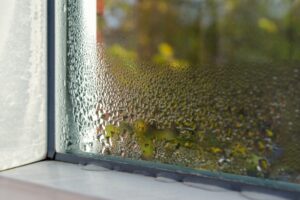 Relative humidity during the summers in Toronto is often extreme. The July daily average is 82% relative humidity, which is 22% higher than what’s already considered high humidity. The increase in moisture in the air is a cause of discomfort on hot days, but high humidity is also a major concern for commercial buildings. Not only do commercial facilities need to worry about comfort levels indoors, they also have concerns about the damage high moisture levels can do to equipment and property and how it can affect process.
Relative humidity during the summers in Toronto is often extreme. The July daily average is 82% relative humidity, which is 22% higher than what’s already considered high humidity. The increase in moisture in the air is a cause of discomfort on hot days, but high humidity is also a major concern for commercial buildings. Not only do commercial facilities need to worry about comfort levels indoors, they also have concerns about the damage high moisture levels can do to equipment and property and how it can affect process.
Humidity control inside a commercial facility is much trickier than in a residential home. A house can sometimes deal with humidity using a standard AC that’s the right size for the space, or a whole-house dehumidifier. With commercial facilities, humidity control is the job of the entire HVAC system—and this is a place where experienced commercial HVAC professionals can make a huge difference. Especially pros like ours, who get to know our clients’ equipment and facilities in detail so we can deliver the customized work necessary.


 When you own and operate a business that relies on heating, ventilation, and air conditioning on a daily basis, it’s vital you have a relationship with a commercial HVAC contractor. You can’t depend on amateurs to handle your regular maintenance service or to come to your rescue when you have a problem like a failed server room cooling system or a complete loss of warm air circulation during the winter. Even simple residential HVAC systems must have a licensed professional to take care of them—and commercial systems are far more complex and intricate.
When you own and operate a business that relies on heating, ventilation, and air conditioning on a daily basis, it’s vital you have a relationship with a commercial HVAC contractor. You can’t depend on amateurs to handle your regular maintenance service or to come to your rescue when you have a problem like a failed server room cooling system or a complete loss of warm air circulation during the winter. Even simple residential HVAC systems must have a licensed professional to take care of them—and commercial systems are far more complex and intricate. Hydronic heating is any type of heating done through the circulation of heated liquid. It is sometimes called radiant heating, although in industrial use
Hydronic heating is any type of heating done through the circulation of heated liquid. It is sometimes called radiant heating, although in industrial use 